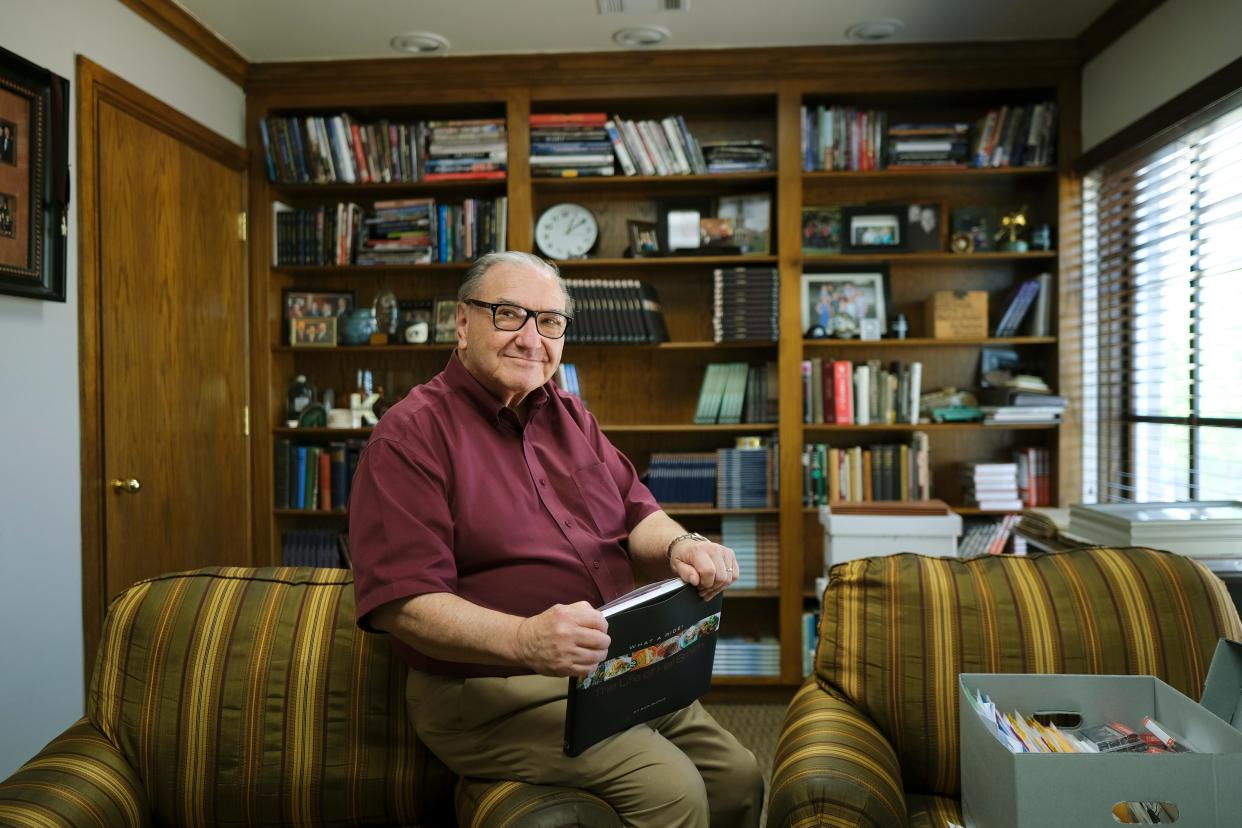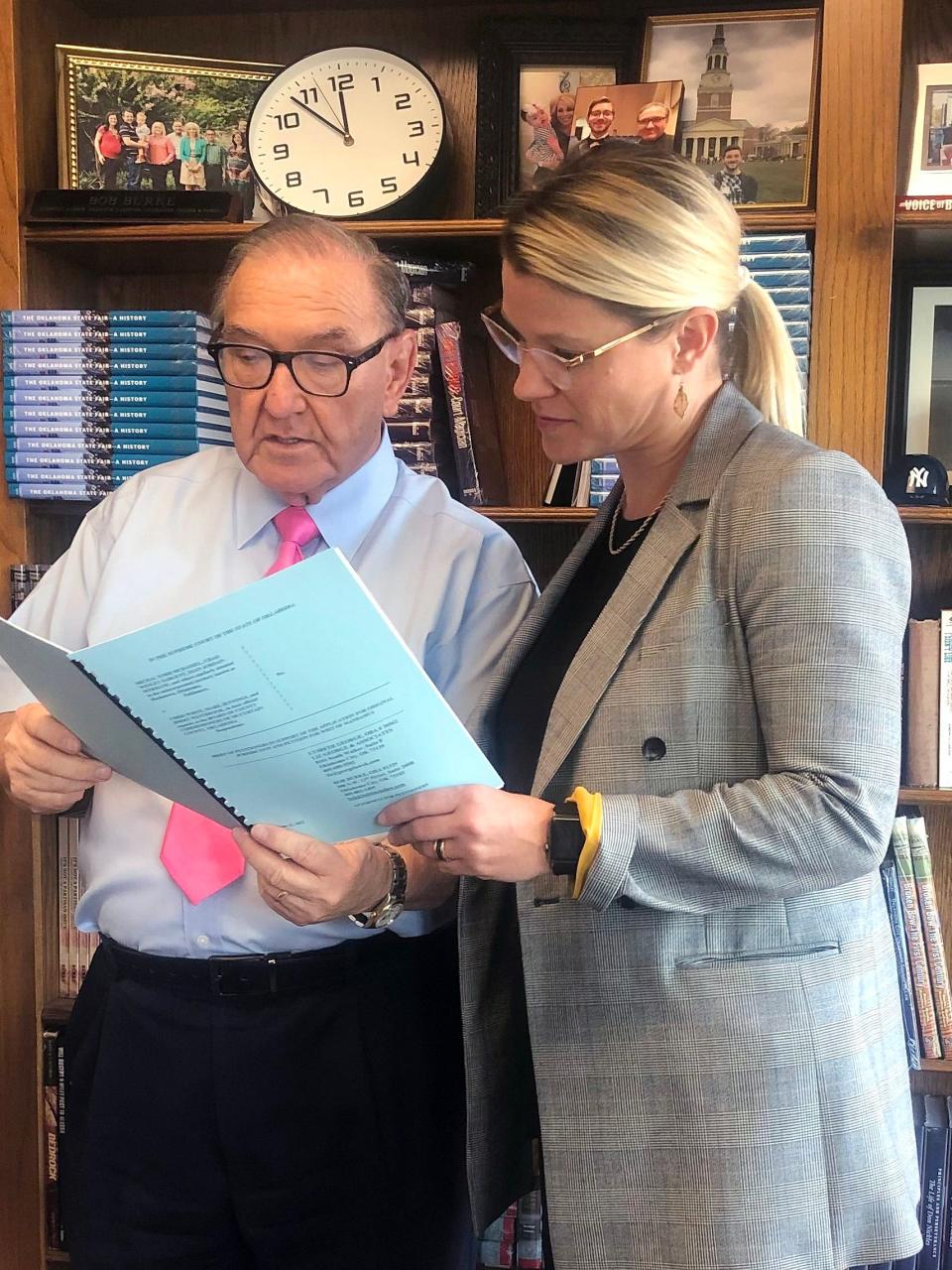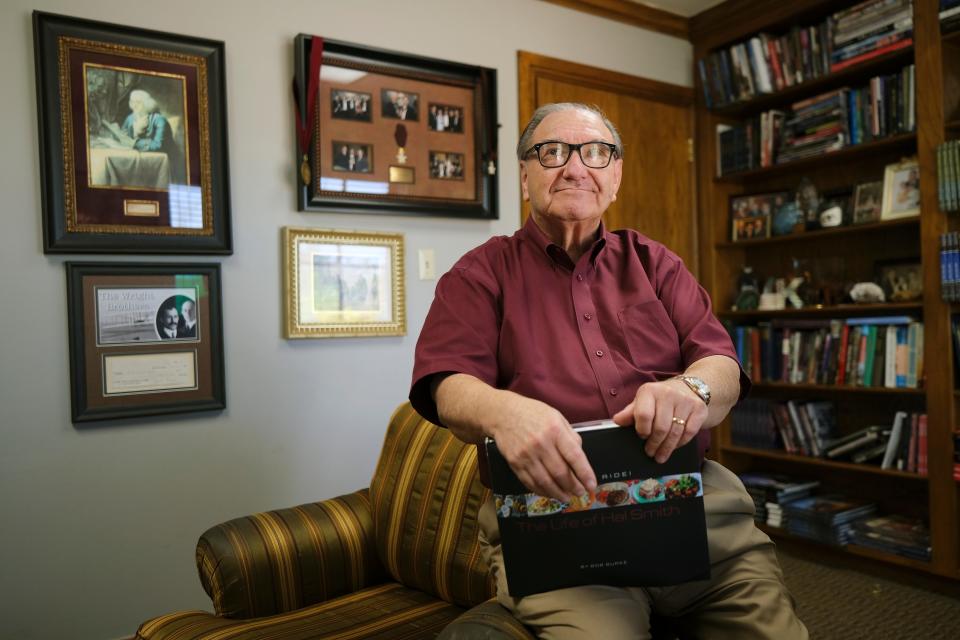'These are unprecedented times in Oklahoma,' says Hall of Fame historian Bob Burke

- Oops!Something went wrong.Please try again later.
Oklahoma City attorney Bob Burke may know more about Oklahoma history than any other living person.
Born in Broken Bow 76 years ago, Burke has both a degree in journalism and a law degree, and he's practiced both disciplines.
As a noted labor attorney, Burke launched a constitutional challenge to a 2013 Oklahoma workers' compensation law that gave Oklahoma the lowest benefits for injured workers in the nation, filing more than 100 appeals with the Oklahoma Supreme Court. By 2022, 68 provisions of the law had been found unconstitutional or invalid. The Oklahoma Legislature struck additional provisions and workers were granted increases in benefits.
Burke was also a national spokesman against a new workers' compensation plan that would have allowed employers to basically decide on their own what injuries they would pay for. The Oklahoma Supreme Court ruled it unconstitutional, and the decision shut down similar plans in several Southern states.
As a journalist, Burke has written more than 100 nonfiction books, many of them biographies of noted Oklahomans like Will Rogers, Wiley Post and former governors George Nigh and David Boren. Others were about historical events like the OKC bombing, the Great Depression and other topics. He's a member of both the Oklahoma history and journalism halls of fame.

Here are just a few of Burke's thoughts about Oklahoma's history, some of the people who made that history and how he thinks history should be taught to a new generation.
Q: Do you think we're living through a historic time today in Oklahoma?
A: Yes, I think we are. We are seeing what I call an unprecedented attack on some of our institutions by elected officials. I'm not naming any names. There are those who would like to do away with the non-political way that we select judges in Oklahoma and move to a system where the governor could appoint any lawyer in the state as a Supreme Court justice. More than 50 years ago we had a horrible Supreme Court scandal that sent three justices to prison for taking bribes. Currently, we have the judicial nominating commission that has worked beautifully and smoothly ... so it's very non-political.
Analysis: Right-wing groups, Catholic Church are behind effort to change how Oklahoma judges are appointed
Q: Are other institutions under attack?
A: Another is the separation of church and state. It has always been accepted from the founding fathers that we ought to keep church away from state. Our young country had come from England, where you had a state sponsored religion. So now we have attempts to use taxpayer money for religious schools.

Q: Do you think Oklahoma has become more conservative over the years?
A: We were always a conservative state, even when we were controlled by Democrats. The national Democratic Party became very liberal. Most Oklahoma Democrats did not go that way.
Q: Looking back over Oklahoma's history, what particular events do you find most fascinating?
A: I believe the most interesting 10 days in Oklahoma history were in 1963. Robert Kerr, the uncrowned king of the U.S. Senate and a major, major political player, died, and there was a fight to see who would replace him. President Kennedy and Vice President Lyndon Johnson came to the funeral in Oklahoma City, and Johnson was overheard whispering to Grace Kerr (the senator's widow) that she or one of her sons ought to be the next senator. Our governor, J. Howard Edmondson, asked President Kennedy, 'should I appoint one of the Kerrs to fill that spot?' And Kennedy said, 'governor, if you had died, would they appoint one of your family?' So in the end, Edmondson resigned as governor, and George Nigh, who was the lieutenant governor, appointed him to be the new senator.
Q: Whom do you find the most interesting person in Oklahoma history?
A: Well, this is a bad guy in a lot of ways — Alfalfa Bill Murray. He was chairman of our constitutional convention. He was a known racist and disparaged Native Americans and Black people, no question. But he is interesting because he helped form many of our constitutional principles. He was our first speaker of the house and was governor during the Great Depression. My hero in political life — and I'm a lifelong Democrat — is a Republican named Henry Bellmon, our first Republican governor. A longtime senator who was an honest guy. We could sure use a Henry Bellmon in Oklahoma today.
Q: Do you believe young people today in Oklahoma are being taught fairly and accurately about the state's history?
A: It's been a long time since I've been in school, but even with my children, I don't believe the Tulsa massacre in 1921 or the massacre of some of our Native Americans in pre-statehood days has ever been told in the textbooks, at least until recently. I give speeches about historical events like that in Oklahoma, and people will say, 'I never heard about that.' We just didn't cover what I believe are ugly parts. For example, the Ku Klux Klan in the 1920s was so powerful it controlled much of the government, and we didn't learn that growing up. It's important to study even the ugly parts of our history. If we don't talk about our mistakes with the next generation, how will they learn?
This article originally appeared on Oklahoman: Historian Bob Burke on Oklahoma history, and what's happening now

